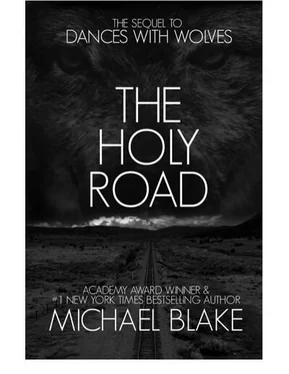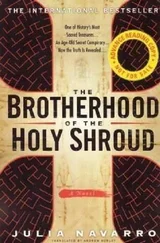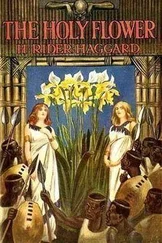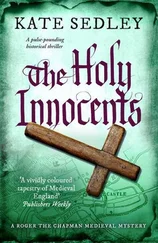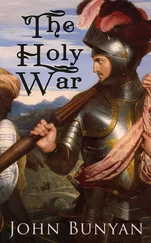Michael Blake - The Holy Road
Здесь есть возможность читать онлайн «Michael Blake - The Holy Road» весь текст электронной книги совершенно бесплатно (целиком полную версию без сокращений). В некоторых случаях можно слушать аудио, скачать через торрент в формате fb2 и присутствует краткое содержание. Год выпуска: 2011, Жанр: prose_military, на английском языке. Описание произведения, (предисловие) а так же отзывы посетителей доступны на портале библиотеки ЛибКат.
- Название:The Holy Road
- Автор:
- Жанр:
- Год:2011
- ISBN:нет данных
- Рейтинг книги:3 / 5. Голосов: 1
-
Избранное:Добавить в избранное
- Отзывы:
-
Ваша оценка:
- 60
- 1
- 2
- 3
- 4
- 5
The Holy Road: краткое содержание, описание и аннотация
Предлагаем к чтению аннотацию, описание, краткое содержание или предисловие (зависит от того, что написал сам автор книги «The Holy Road»). Если вы не нашли необходимую информацию о книге — напишите в комментариях, мы постараемся отыскать её.
The Holy Road — читать онлайн бесплатно полную книгу (весь текст) целиком
Ниже представлен текст книги, разбитый по страницам. Система сохранения места последней прочитанной страницы, позволяет с удобством читать онлайн бесплатно книгу «The Holy Road», без необходимости каждый раз заново искать на чём Вы остановились. Поставьте закладку, и сможете в любой момент перейти на страницу, на которой закончили чтение.
Интервал:
Закладка:
The loss of four warriors was sad enough, but there was another aspect to the debacle that made it particularly bitter. The bodies of the dead had not been retrieved and it was essential that they be
brought back lest their spirits be left to wander in lonely, earthbound confusion.
Especially revolting was the reported presence of Tonkawas, one of the Comanches' bitterest enemies. Long subjugated by the whites, the Tonkawas had fallen into the habit of taking the white man's money in exchange for guiding them against the Comanche. Not only did they kill Comanches and take their scalps, it was known to all that Tonkawas coveted the flesh of their enemies. Comanches taken alive were sometimes thrown whole onto large fires, their meat roasted black before being taken into the mouths of the Tonkawas.
A member of Wind In His Hair's extended family, a brother-in-law, was one of the dead, and now, instead of relaxing at the end of their journey the great warrior from the north found himself attending a round of councils. There was no question but that a party had to go our and fetch the bodies back, and that speed was important, but putting together the party was, as always, a complicated undertaking. The size of the party, the warriors it would comprise, and the time it would consume were all weighty issues, and all were aggravated by the weakened condition of the Honey-Eater band.
People were eager to have Wind In His Hair at their councils. It reassured them to have such a great warrior in their midst, but the standing he enjoyed in his own village was not transferable. If it had been, Wind In His Hair would have organized a party and put it into the field as quickly as possible. Instead, he was forced to stand back as the depleted and demoralized Honey-Eaters debated how to commit their meager resources.
After three sleeps of constant wrangling, a rescue party consisting of only twelve warriors, two of them barely tested boys, finally departed.
Wind In His Hair rode with them as a full-fledged member. Heavy Runner, a middle-aged warrior with a lifetime of honors, headed the small group. He kept Wind In His Hair by his side, but even the presence of these two outstanding warriors did little to bolster the group's spirits. This was not a Comanche war party of old, a juggernaut of heavily armed warriors sweeping all from their path.
It was a small band of men with only six rifles, driving deep into contested country, whose focus was not on victory but survival.
None of the men who had escaped the white rangers had been able to agree on the exact spot of the skirmish, and since all of them had been shot and were recovering, no one was along to pinpoint where the dead had fallen. They were traveling blind, and as the party pushed east the country became even more hilly and dense, and Wind In His Hair, unused to such terrain, began to feel more nervous. To maintain silence, all in the party were forbidden to use rifles unless there was an emergency. Animals were to be taken by bow, and Heavy Runner prudently insisted that the camps they made be dry and fireless.
There were no incidents and on the morning of their fourth day out, the small band of warriors reached the vicinity of the fight with the rangers.
Two men were dispatched to scout both sides of the stream while the balance of the party remained sequestered. At mid-morning the scouts returned to camp with the news that they had located the site. White men were there — two hair-mouths in long white coats with six blue-coated soldiers to guard them. They had two wagons and had pitched a few tents along the slow-running river. The blue-coated soldiers had not established a perimeter but were lounging around their tents while their horses grazed untended.
What the hair-mouths in the long white coats were doing the scouts could not ascertain. Two fires had been built on the banks of the stream. Over the flames sat two large kettles filled with boiling water. The white-coated men seemed to be in charge of the cooking because when the scouts saw them they were going back and forth between the kettles stirring the bubbling water with wooden paddles.
A hundred yards upstream from the strange camp the scouts had discovered a wagon and had crept close enough to confirm that this was where the Comanche warriors had lost their lives. The wagon was covered with a canvas tarp, but they could see two sets of moccasined feet resting on the downed tailgate.
The Honey-Eaters and their famous friend from the north immediately convened a council to sift through the information brought back by the scours. For a time they discussed what purpose whites might have in camping at the ghoulish site, particularly the white-coated hair-mouths whom the soldiers were protecting. could it be that they were feasting, that they were imitating the hated Tonkawas? Perhaps they were trying to draw power from the slain warriors? Was some dark, unknown magic being performed by the whites? Wind In His Hair knew that white medicine men sometimes wore white coats and theorized that they might, for some inexplicable reason, be trying to raise the dead.
But it was all conjecture, and since no one could understand it, this line of inquiry was soon dropped in favor of what could be done to retrieve the remains of their friends and relatives. The younger men wanted to attack, taking as many scalps as possible, but Heavy Runner and Wind In His Hair both spoke against this notion, reminding everyone of the purpose of their mission, and pointing out the foolhardiness of putting themselves in needless jeopardy. They were already surrounded by danger and little could be gained by exposing themselves to more.
The plan they decided on was designed to frighten the whites, driving them off long enough to let the party gather up what remained of their comrades and escape back to the west.
The two youngest members of the team, both of whom had strong, fast ponies, would cross the river far upstream, then backtrack under cover, stopping at a point opposite the main party. There they would wait for a signal to be given by one of the warriors who was particularly adept at mimicking the feeding sounds of quail. At that moment the boys would burst from their hiding place on the other side of the river waving blankets at the whites' loose horses. They were to chase these horses downstream. At the same time the ten remaining warriors would loose their arrows at the white camp. They would do this with as much whooping as they could muster, hoping that the whites would envision a much larger force of attackers. Then they would emerge on the banks of the stream and pretend to pursue them. If the whites continued to flee, the warriors would gradually peel off and backtrack upriver to perform the real work of their mission. The few warriors who continued the chase could then fire their rifles if they felt it was necessary but until that time no one would fire unless it was absolutely necessary.
The plan worked to perfection. When the sun dipped close to the horizon the signal was given and the boys burst from the undergrowth on the other side of the river. Most of the American horses were still loose and stampeded downriver. A split second later the main body opened up with a tremendous cacophony of yelling. The two white-coated men scrambled onto a canvas-covered wagon. They were ungainly, and as they clambered into the wagon, one of them took an arrow high in his leg. Screaming, he tumbled into the back of the wagon while the other man desperately urged the horses forward. The soldiers were too surprised to do much more than fire a few wild shots in the direction of the attack as they flailed about for their horses. Some of them rode double as they pursued the wagon, which was plunging frantically downstream.
Three warriors kept after the small party of white men, and the two boys who had started the American horses disappeared downriver. That left seven warriors, including Wind In His Hair and Heavy Runner to investigate the odd camp on the riverbank.
Читать дальшеИнтервал:
Закладка:
Похожие книги на «The Holy Road»
Представляем Вашему вниманию похожие книги на «The Holy Road» списком для выбора. Мы отобрали схожую по названию и смыслу литературу в надежде предоставить читателям больше вариантов отыскать новые, интересные, ещё непрочитанные произведения.
Обсуждение, отзывы о книге «The Holy Road» и просто собственные мнения читателей. Оставьте ваши комментарии, напишите, что Вы думаете о произведении, его смысле или главных героях. Укажите что конкретно понравилось, а что нет, и почему Вы так считаете.
